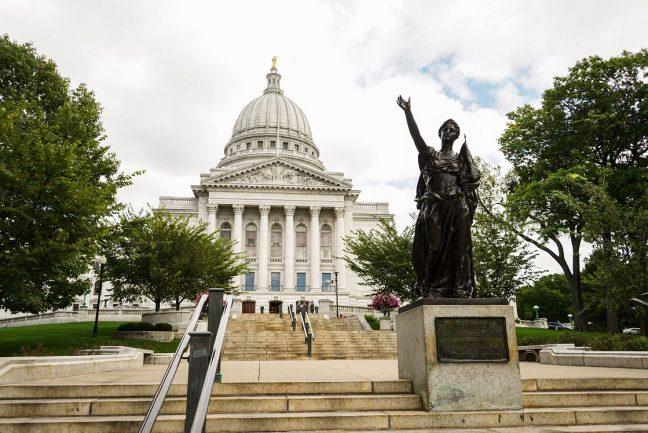On Sept. 21, the city reinstalled the statues of “Forward” and Colonel Hans Christian Heg in their former location outside the Capitol building after protesters tore them down June 23, 2020.
I support this action by the State Capitol Residence and Executive Board. The action successfully denounces the criminality that brought the statues down in the first place.
Last year we saw the chaos that surrounded Madison, Milwaukee and other cities across the country. Many statues of American heroes like George Washington were torn down, even if they were amid the Black Lives Matter movement. These actions made many Americans question whether the rioters challenged police brutality or the entirety of America instead.
Plenty of statues that represent slavery or other historical offenses, like those of confederate generals, were justifiably challenged during protests for racial equality.
But, statues that represent progress and equality like that of Heg, a civil war colonel who fought for slavery abolition, should be respected by those that admire these qualities.
Heg grew up in Norway and immigrated to Wisconsin at ten years old. He then went to California for the gold rush, but after his parents died two years later he returned to take care of his siblings and run the family farm. Later, he was elected and appointed to multiple state and local governmental positions first as a Free Soiler and then as an ardent anti-slavery Republican.
He eventually became State Prison Commissioner of Wisconsin, where he was in favor of policies that “reclaim the wandering and save the lost,” which could even be a slogan for a prospective progressive today. When the Civil War broke out, he was made colonel and headed the 15th Wisconsin Regiment, which was a regiment made largely of immigrants from Nordic countries.
By all accounts, these men, though not all born here, were true Americans who fought for the rights of all. After serving for two years in training and battle, he died at 33 in the Battle of Chickamauga, fighting for the freedom of slaves.
Heg was a representation of both the American dream and freedom for all people. He not only put his life on the line for the liberation of slaves but also advocated for progressive policies and the ideals before they were mainstream in America.
Despite his contributions to society, his statue was torn down and dragged away from the Capitol. I hope they didn’t know the history of this hero and instead merely took down the statue because it was located at the Capitol.
The most important part of this situation is how Madison reinstated the statues, and other cities should follow this model. Madison is not a conservative city, and it often strives for equality and removing prejudice from all of its institutions. By putting the statues back up, the city recognizes that for progress to continue you cannot cede to every whim of certain protesters.
The protesters are obviously pointing out problems with current systems in place. But when they attack the ideals of what America should be striving for, they need to be checked, but that does not mean people aren’t listen to their grievances. People of color should lead the public input on how to correct our institutions, and the government must try to understand their pain and provide what they need to feel equal and fairly treated.
But, we should avoid letting a few individuals within these movements destroy major cities where people live and businesses operate. Listen to people that are airing their grievances legitimately and reject all others when they are doing so without regard for facts, historical accuracy or any consideration for the law.
Our freedom to assemble is required. Without it, we would have had no civil rights movement, no workers movements and be much further in the past than we are today. More cities should follow Madison’s lead and put back up many of the statues and buildings that represent social progressivism in America.
Jonathan Draeger (draegerrrr@gmail.com) is a freshman studying economics.


